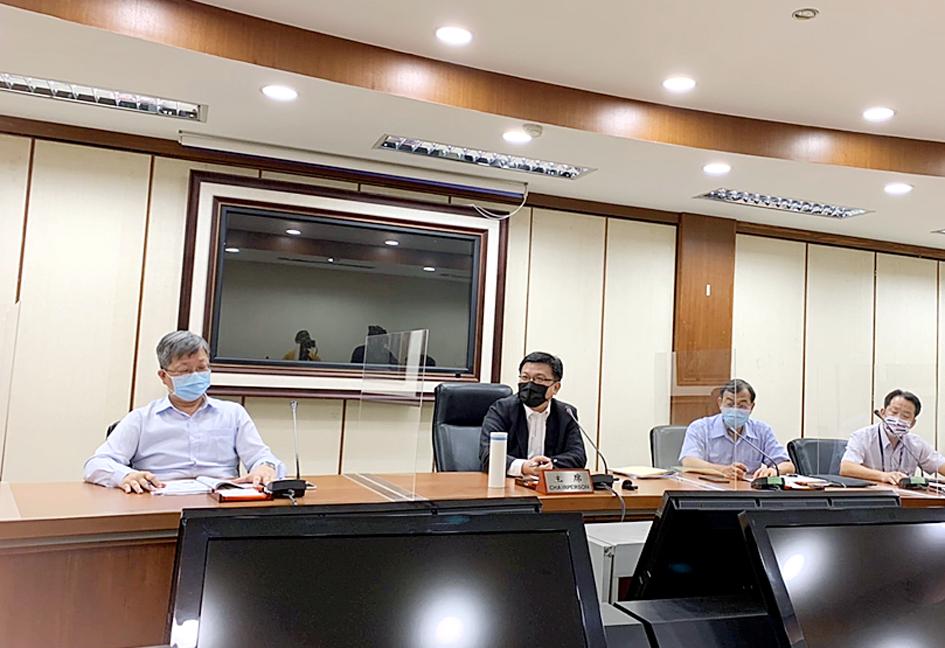Taiwan’s electricity rates are to remain at NT$2.6253 per kilowatt hour (kWh) for the next six months despite rising fuel costs, the Ministry of Economic Affairs said yesterday.
The decision came after a meeting of its electricity price review committee, which determined for the seventh consecutive time that prices are to be kept frozen. A rate hike would hurt the economy, which is still reeling from this year’s COVID-19 outbreak, the ministry said.
“As we are still in the process of providing relief to businesses, the committee decided that it was not the right time to raise prices,” Bureau of Energy Deputy Director-General Lee Chun-li (李君禮) said.

Photo: Lin Jing-hua, Taipei Times
If the electricity rate had been calculated with rising fuel costs taken into account, it would have been raised by 1.20 percent, taking it to NT$3.8253 per kWh. The next meeting to determine electricity rates is to take place in April next year.
Fuel is the primary cost consideration of the state-run Taiwan Power Co (Taipower, 台電). According to Taipower’s latest data, about 40 percent of the country’s electricity is generated from gas and 35 percent from coal.
While about 60 percent of the gas is secured through long contracts tied to the cost of oil, the rest is secured on the “spot market,” which has been surging around the world. Coal prices are also up, the ministry said in a statement.
Renewable energy is a growing source of power, particularly solar. About 10 percent of yesterday’s power generation was solar generated at its peak mid-afternoon, Taipower said.
Due to climate change, Taiwan’s “summer peak usage” has started earlier, resulting in the ministry moving its higher summer pricing two weeks earlier into mid-May starting next year.
“In accordance with Taipower’s recommendations, summer pricing will start on May 16 next year for high-voltage users,” the ministry said.
The changes are to be implemented first for Taiwan’s approximately 25,000 high-voltage electricity users, it said.

GEOPOLITICAL ISSUES? The economics ministry said that political factors should not affect supply chains linking global satellite firms and Taiwanese manufacturers Elon Musk’s Space Exploration Technologies Corp (SpaceX) asked Taiwanese suppliers to transfer manufacturing out of Taiwan, leading to some relocating portions of their supply chain, according to sources employed by and close to the equipment makers and corporate documents. A source at a company that is one of the numerous subcontractors that provide components for SpaceX’s Starlink satellite Internet products said that SpaceX asked their manufacturers to produce outside of Taiwan because of geopolitical risks, pushing at least one to move production to Vietnam. A second source who collaborates with Taiwanese satellite component makers in the nation said that suppliers were directly

Top Taiwanese officials yesterday moved to ease concern about the potential fallout of Donald Trump’s return to the White House, making a case that the technology restrictions promised by the former US president against China would outweigh the risks to the island. The prospect of Trump’s victory in this week’s election is a worry for Taipei given the Republican nominee in the past cast doubt over the US commitment to defend it from Beijing. But other policies championed by Trump toward China hold some appeal for Taiwan. National Development Council Minister Paul Liu (劉鏡清) described the proposed technology curbs as potentially having

EXPORT CONTROLS: US lawmakers have grown more concerned that the US Department of Commerce might not be aggressively enforcing its chip restrictions The US on Friday said it imposed a US$500,000 penalty on New York-based GlobalFoundries Inc, the world’s third-largest contract chipmaker, for shipping chips without authorization to an affiliate of blacklisted Chinese chipmaker Semiconductor Manufacturing International Corp (SMIC, 中芯). The US Department of Commerce in a statement said GlobalFoundries sent 74 shipments worth US$17.1 million to SJ Semiconductor Corp (盛合晶微半導體), an affiliate of SMIC, without seeking a license. Both SMIC and SJ Semiconductor were added to the department’s trade restriction Entity List in 2020 over SMIC’s alleged ties to the Chinese military-industrial complex. SMIC has denied wrongdoing. Exports to firms on the list

TALENT FACTOR: The nation’s chip sector would be difficult to replace, but to maintain that advantage, Taiwan must retain skilled workers, an academic said A group of experts on Sunday called on Taiwan to strive to maintain its world-leading position in the semiconductor industry, with a US-China chip dispute expected to continue regardless of who becomes the next US president. Tamkang University Graduate Institute of International Affairs and Strategic Studies director Li Da-jung (李大中) said at a Taipei seminar on global semiconductor security that the relationship between the two superpowers would remain confrontational. There appears to be “no turning back” in US-China relations, as US presidential candidates US Vice President Kamala Harris and former US president Donald Trump are both expected to continue Washington’s hawkish stance